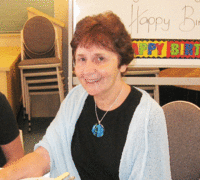Reflect
Veronica M Lawson RSM
4 May 2012
John 15:1-8 Again and again, life’s experiences teach us that, as members of the Earth community, we cannot make it on our own. We need one another and we need the other living creatures that inhabit our planet. The gospel reading reminds us that as baptised Christians we are not just intimately linked with each other but that the source of our unity is the Risen Christ. As limbs and leaves and sap of the same vine, we simply cannot survive without each other.
Again and again, life’s experiences teach us that, as members of the Earth community, we cannot make it on our own. We need one another and we need the other living creatures that inhabit our planet. The gospel reading reminds us that as baptised Christians we are not just intimately linked with each other but that the source of our unity is the Risen Christ. As limbs and leaves and sap of the same vine, we simply cannot survive without each other.
The vine image picks up one of the most potent biblical images for God’s relationship to the people of Israel. It is an image of life and growth, of colour and vibrancy. It holds the promise of a life-sustaining grape harvest that is ultimately transformed into wine, the biblical symbol for joy. God brought Israel ‘the vine’ out of Egypt (Psalm 80:9). For the prophet Isaiah, Israel is also a vineyard planted and nurtured by God (Isa 5:1-7; 27:3). For Jeremiah, Israel is the choice vine ‘of fully tested stock’ planted by God (Jer 2:21).
The Johannine Jesus takes the image further: Jesus is the vine and God is the vine grower. The potency of this image resides in the fact that a vine without branches is inconceivable. It draws us into the mystery of the mutual interchange of life between us and the risen Christ, into the mystery of God. It also invites us to acknowledge our interconnection with the whole of the Earth community, to nurture the wonderful biodiversity of our planet, and to accept the inevitability of pruning if we are to ‘bear fruit’ and ‘become disciples’.
‘Pruning’ can take various forms. A chance encounter, a sudden inspiration, a word from a friend, an unexpected illness, a confronting story: any such experience can bring us to our senses and serve as a ‘pruning’ device. The first reading for today recounts the story of Saul of Tarsus who is ‘pruned’ quite dramatically through his encounter with the Risen Christ on the road to Damascus. He is transformed from persecutor to defender of Christ and Christ’s followers. Saul ‘bears much fruit’ and ‘becomes a disciple’. The Greek-speaking Christian Jews are suspicious, even murderous, when he tries to preach the gospel among them.
Peace ensues, however, and the movement takes hold in the regions where Jesus had first preached the gospel. It is worth reflecting on the cultural diversity that characterised earliest Christianity and the tensions that had to be resolved between different language groups or groups of different ethnic origin for the gospel to flourish and bear fruit. John’s gospel is written against the backdrop of such ‘pruning’ within the early communities. Sometimes the requisite ‘pruning’ is respectfully hearing a point of view that differs from one’s own.